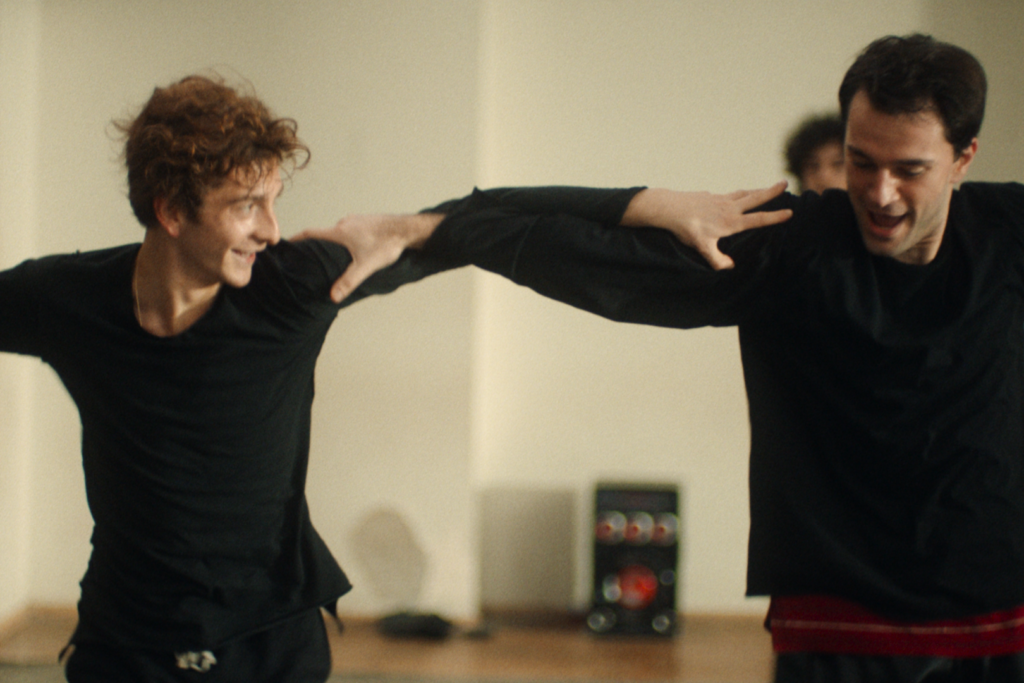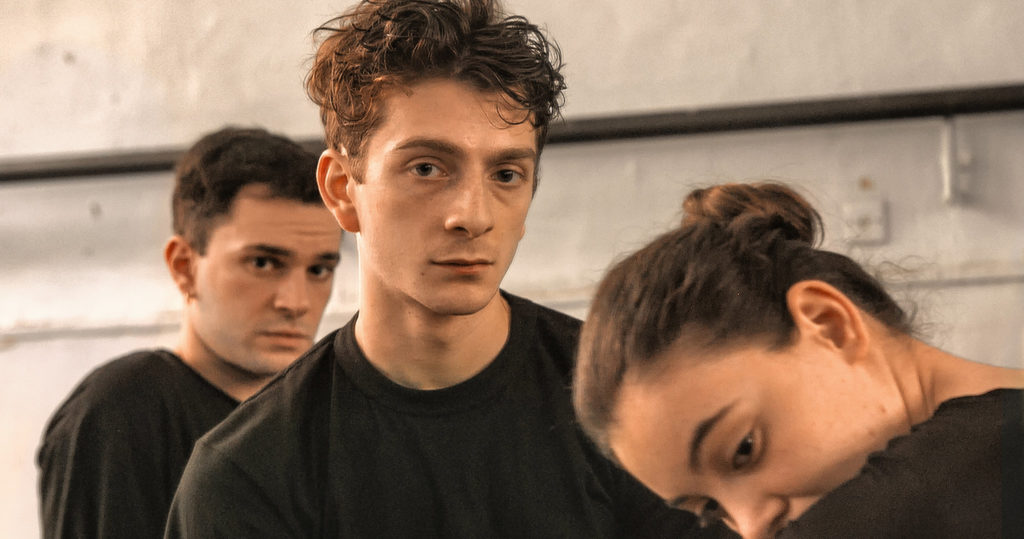
And Then We Danced uses it’s opening scenes to make clear that it’s utmost thematic concern is that of “tradition.” Whether the rigid roles of Georgian dance or familial and social expectations, the movie returns to the concept of tradition via tropes and tangents. In these early scenes, we are given a crash course in Georgian dance—what it means to our central character, but also what it means to a nation. “There is no sex in Georgian dance,” one dance instructor sternly admonishes; the leader of Georgian dance explains it even more firmly as “the spirit of our nation.” Our protagonist, though, understands it both more simply and broadly than either. When asked what Georgian dance is, he responds questioningly with one word: “Tradition?”
Georgian dance, as a term, represents the host of traditional and folk dance styles of the nation of Georgia. Stylistically, they are rooted in movements from the military, sports, and holiday celebrations dating back to the Middle Ages. For many Georgians, these traditional dances represent not just their history and ancestry, but the very nation itself—the two are tied together, culturally and politically. The dances themselves have an austere quality to them, chaos contained in rigid and rapid movements, somehow unpredictable and rote all at once. Tied up into these dances are strict gender norms: men must be strong and emotionless; women, virginal and soft.

The movie follows Merab, a young man steeped in the world of Georgian dance since he could walk. He dreams of moving to a principle position in the company, to make money and travel the world. Simultaneously, as he gets closer to achieving his dreams, a new presence in his troupe arouses a rather familiar path of self-discovery and queer sexuality. The story being told is quite obvious for the first two-thirds of the movie, as we are treated to well-worn territory where it concerns coming out and queer cinema: breathing in a crush’s clothes, dancing to Robyn and ABBA, stories of gay bashing, etc.
Throughout the movie, the camera is fixated on Merab, rarely breaking from him, except for an expositional scene here and there. It follows him incessantly, but curiously and lovingly. In this way, we are brought into the world that Merab lives in, slowly at first, but with increasing speed forward. Levan Gelbakhiani is exceptionally mesmerizing in the lead role, able to traverse the rather broad emotional territory his character covers. Gelbakhiani carries this movie on his shoulders, sometimes quite literally as the camera follows him from the back, an emotional display of purely physical performance.
In one particularly vital scene, we watch Merab lose himself to a more sensual, soft style of dance—set to Robyn, of course—seducing his love interest in movements both reminiscent of the Georgian dance we’ve seen and yet completely subverted. Just like Merab’s variation on traditional movement, And Then We Danced too shifts our expectations with an incredible final act of pure cinema. In one “long take” at a wedding party– filmed so effortlessly by director Levan Akin and cinematographer Lisabi Fridell—the camera captures a reunion and a departure. Merab is its central focus, but the vital characters we’ve seen throughout the movie drift in and out, hovering in corners and behind glass. It is a climax of the movie, representing a quite visceral change for Merab, but likewise an epochal shift for this little community of characters we’ve grown to know. When resolution does finally come, both at the wedding party and beyond, it’s affectingly not as expected nor with who we’d presume.

Interestingly, the movie only briefly explicitly comments on the ephemeral nature of something like tradition, even as much as it’s concerned with this nature. Merab’s dance instructor quite casually says, “Georgian dance used to be soft, but then we changed it.” The final scene, though, elaborates on this and then some, visually demonstrating that rigid rules and social order—whether in Georgian dance or, broadly, in the nation of Georgia—can hurt those who must follow them rigorously, even as much as they are simply made up, most often divorced from real human feeling and expression. We watch Merab bend and break his body to be more “like a monument” as his dance instructor commands, his innate softness and sensuality broken down into something firm and emotionless. And in this final dance, the break is made painfully clear. Merab though, instead, transforms himself and the traditional. It becomes something familiar but new, something beautifully all his own and an extension of these historical, familial movements. His self finally blares forth powerfully and beautifully, finally not for the gaze of a star-crossed love, or in service of familial expectations, or to appease the disapproving glare of an older generation.
And Then We Danced tracks a rewriting of tradition, most obviously of Georgian dance. But it also represents a sort of return and variation onto the coming out story that we’ve seen and are now able to categorize onscreen. Sometimes it is easy to roll one’s eyes at an ABBA or Robyn needle drop, but And Then We Dance uses them to remind us that these tropes and cliches represent something greater that unifies folks across generations. Coming out is far from the same for every queer individual, just as much as it’s a process and not a moment, but there are familiar shapes and textures shared by every queer person.
The movie is admittedly rote to a degree, particularly in its first couple acts. By movie’s end, though, writer and director Levan Akin uses his movie to counter the austerity of rigid, capital-T “Tradition,” as it is sometimes used to maintain power structures. He instead proposes that it can be something warmer and more deeply humane, something more like home and family, if only those rigorously maintaining it would let it.
And Then We Danced
2019
dir. Levan Akin
131 min.
Available to rent via Coolidge Virtual Screening Room – Click here for details
Streaming is no substitute for taking in a screening at a locally owned cinema, and right now Boston’s most beloved theaters need your help to survive. If you have the means, the Hassle strongly recommends making a donation, purchasing a gift card, or becoming a member at the Brattle Theatre, Coolidge Corner Theatre, and/or the Somerville Theatre. Keep film alive, y’all.

